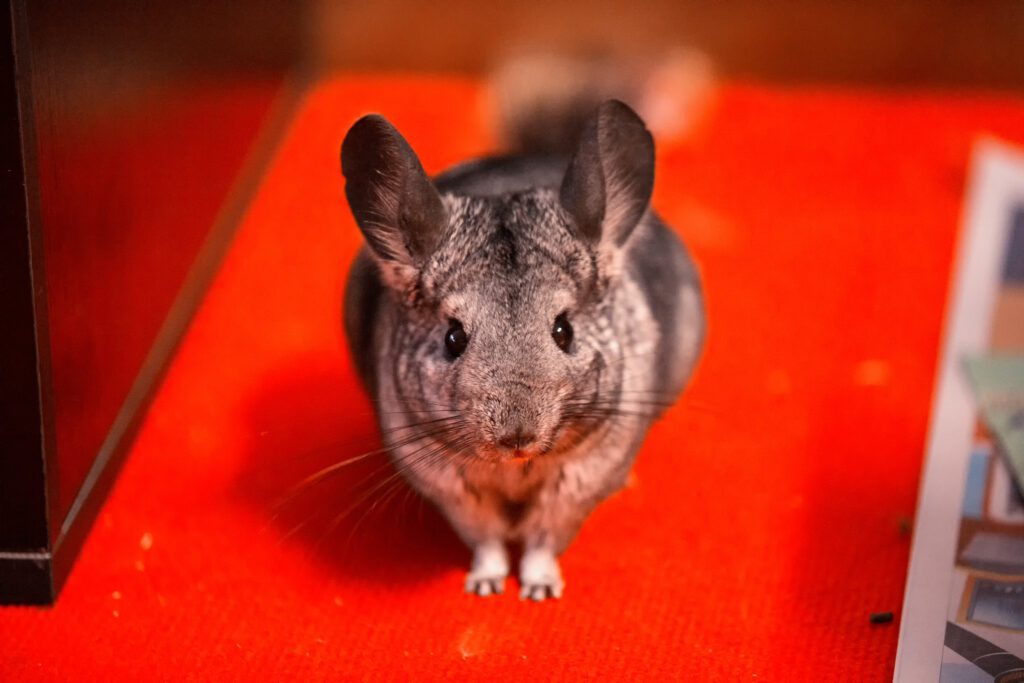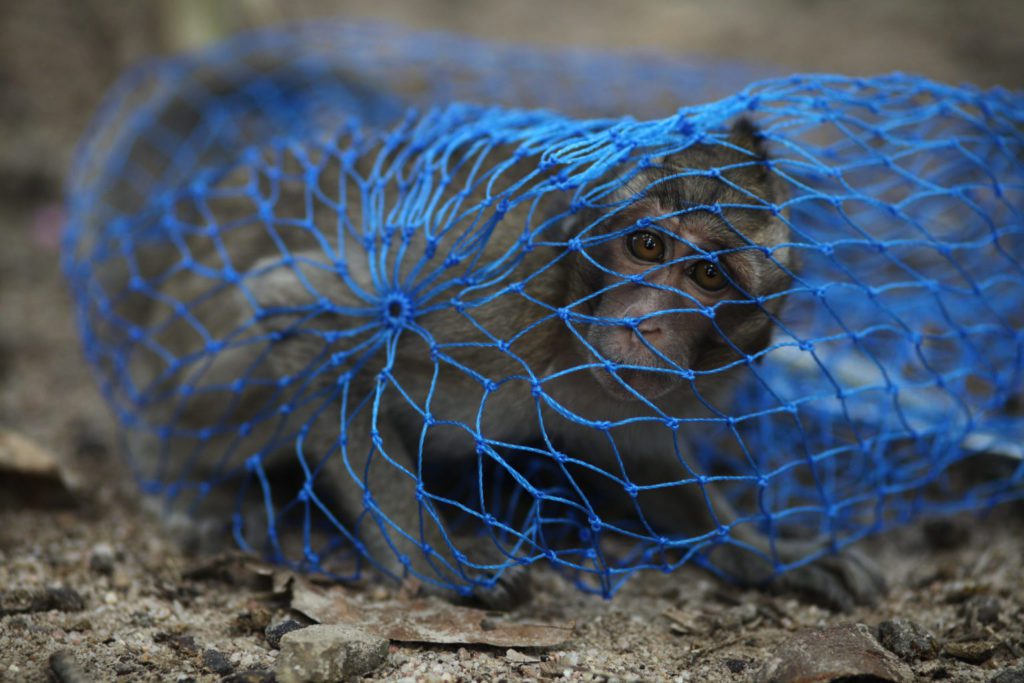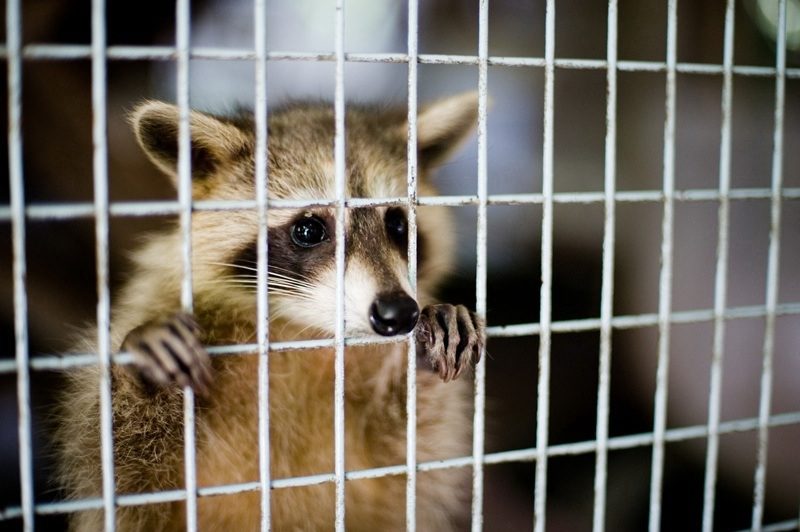


The agency has neglected its federally mandated responsibilities—even in the face of years of their own inspectors’ reports of abuse.
By Nancy Blaney, Independent Media Institute
6 min read
For years, U.S. Department of Agriculture (USDA) inspectors dutifully documented extensive animal suffering at Moulton Chinchilla Ranch (MCR), a chinchilla breeding facility in Minnesota. In 2021, MCR was the only USDA-licensed supplier of chinchillas for research, according to National Geographic and Science. Meanwhile, USDA inspections of MCR reported seeing chinchillas, many destined for experimentation, with eyes swollen, weeping, and sealed shut; a thin, unresponsive chinchilla, missing part of her leg, brutally “euthanized” by breaking her neck; a dead chinchilla left on top of a cage for so long that her decaying body had to be peeled off of it.
After failing to confiscate a single chinchilla from MCR—even as the USDA’s own inspectors issued citation after citation for Animal Welfare Act (AWA) violations over a period of five years from 2013 to 2018—the department finally filed a case in November 2018 against MCR’s owner, dealer Daniel Moulton. Following even more incomprehensible delays, the case finally went to court in 2021.
In October 2021, USDA Administrative Law Judge Jill Clifton ruled from the bench—a highly unusual move—that Moulton’s dealer license must be permanently revoked, calling his 213 “willful” violations “absolutely astounding.” Nevertheless, he was fined a mere $18,000—less than 1 percent of the amount allowed under the law. To make matters worse, he was permitted to keep nearly 700 chinchillas languishing on his ranch for months while he decided whether or not he would file an appeal (and was even granted multiple extensions to do so).
In November, less than a month after the judge’s ruling, the USDA once again documented multiple failures to comply with the law as the chinchillas at the ranch continued to suffer from a lack of adequate veterinary care and staffing. The following month in December, my organization, the Animal Welfare Institute (AWI), sent a letter to the USDA, copying three Department of Justice (DOJ) attorneys, noting that Moulton continued to place his chinchillas “in serious danger.” One of the unambiguous statutory remedies for his violations is confiscation. Again, however, the USDA confiscated none of the ailing animals.
In Judge Clifton’s ruling, she expressed regret “that it took this many years for me to get to this complaint, which was filed November 29, 2018” and explained that the “very, very long delay” was caused by government shutdowns, the COVID-19 pandemic, and “some other difficulties.” Notably, Judge Clifton added, “It should not have taken this long for us to get to this point.”
It took until February 2022 before Moulton stated that he no longer held any chinchillas, according to People for the Ethical Treatment of Animals.
Meanwhile, last fall, the USDA finally revoked the license of Iowa dog breeder Daniel Gingerich, who amassed an unprecedented number of citations for horrific animal mistreatment. Inspectors documented multiple dogs under severe heat stress with no access to drinking water, even as the heat index soared to 119 degrees Fahrenheit; one was in an emaciated state. Another report noted a severely neglected one-month-old poodle puppy crying out and dying before the inspectors’ eyes. Under a settlement, Gingerich was forced to surrender more than 500 dogs and puppies, but only after the DOJ obtained a historic injunction against the breeder after indefensible USDA delays.
These two high-profile cases graphically illustrate how the USDA continues to drag its heels instead of jumping into action to protect animals from immense and avoidable suffering. AWI and other animal advocacy organizations have long documented the department’s inexcusable failure to enforce the Animal Welfare Act, the primary federal law intended to afford basic protections to certain animals that are bred for commercial sale.
The AWA applies to animal dealers, breeders, exhibitors, handlers, and carriers in addition to research laboratories, and sets minimum standards of care that must be provided for animals—including housing, handling, sanitation, food, water, veterinary care, and protection from extreme weather. The law covers warm-blooded species, but expressly excludes mice, rats, and birds bred for research, as well as most farm animals.
It is the responsibility of the USDA’s Animal and Plant Health Inspection Service administrator, its animal care officials, and its general counsel to urgently act on inspectors’ disturbing reports of cruelty, seize animals in need of rescue, and ensure that such appalling mistreatment doesn’t continue. The situation has reached a tipping point.
From 2016 to 2020 (while former President Donald Trump was in office), there was a 67 percent drop in the number of AWA inspections where citations were documented, according to AWI’s research. New investigations plunged by nearly 90 percent during this period. In a July 2021 article about Moulton Chinchilla Ranch, National Geographic pointed out that the USDA under the Trump administration had been hamstrung when it came to enforcing animal welfare law. But the USDA’s failure to adequately enforce the AWA predates the Trump administration and has persisted for decades, as National Geographic later reported in October 2021.
Gingerich, the former dog breeder, was permitted to continue operating after he hid dogs from USDA inspectors, destroyed required acquisition records, and operated “facilities in 10 different locations throughout Iowa, several of which are unlicensed,” stated the Iowa Capital Dispatch, citing federal records. In 2021 alone, before the USDA took action, inspections of Gingerich’s operation yielded 25 reports and more than 200 citations.
In the case of MCR, the USDA has known about the abysmal conditions since at least 2013. Yet the department never followed through on what its inspectors conscientiously recorded by confiscating a single chinchilla or notifying the DOJ, as mandated by the AWA, once it determined that the chinchillas’ health was in serious danger. Since 2014, Moulton has racked up more direct citations (the most severe type of critical citation) than any of the other 10,000-plus AWA-regulated licensees and registrants. The USDA documented direct citations each year from 2014 through 2021, including a 2018 announced inspection, which found 22 chinchillas needing veterinary care.
Chinchillas have large ears, and their hearing is similar to humans, so they are often used for invasive and terminal research on ear diseases. Moulton Chinchilla Ranch has supplied chinchillas to studies affiliated with the National Institutes of Health, the U.S. Navy, Harvard Medical School, and more—even though lab animals with unaddressed health issues can compromise the integrity of the research. Taxpayers’ money has not only been used to fund potentially flawed research but also to support Moulton’s operations.
On the first full day of testimony during Moulton’s administrative hearing, veteran inspector Brenton Cox—discussing inspections from 2014—stated that MCR was the worst facility he had ever seen, that it gave him nightmares, and that he used MCR as a training tool for what a facility should not be. During the hearing (which AWI monitored), the USDA stated that some chinchillas suffered from swellings the size of eggs or golf balls and indicated (over Moulton’s objections) that they were in pain.
But where was this outrage and validation of the inspectors’ vital work years ago, when the department could have acted on their findings and saved so many chinchillas from this ongoing abuse? Instead, in 2019, the USDA helped Moulton with the paperwork to renew his license to operate as a dealer.
Moreover, the research industry enabled Moulton’s cruelty. The Laboratory Animal Science Buyers Guide, published by the American Association for Laboratory Animal Science (AALAS), listed MCR as the only chinchilla supplier despite knowing about the USDA citations. In July, National Geographic stated that the guide also included MCR in its vendor showcase, which touts reaching customers within the “trusted network” of AALAS. Prominent research figures, including Sanford Feldman, director of the Center for Comparative Medicine at the University of Virginia, testified for Moulton and were actively involved in his defense.
It is clear that there needs to be political will to ensure that the USDA will stop allowing facilities to remain persistently and egregiously out of compliance with the AWA regulations and start taking action sooner—not merely when a case becomes highly publicized. In May 2021, U.S. Representative Raja Krishnamoorthi of Illinois reintroduced the Animal Welfare Enforcement Improvement Act, which would protect animals from unscrupulous dealers and exhibitors and close existing loopholes in the USDA’s licensing process that endanger animals and allow chronic violators to escape punishment. These violators include marine theme parks, roadside zoos, and exotic wildlife operations such as the infamous Greater Wynnewood Exotic Animal Park featured in the Netflix series “Tiger King,” which has now been closed to the public.
Additionally, legislation introduced in December 2021 by Iowa Representative Cindy Axne would require USDA inspectors to document and report all AWA violations, confiscate suffering animals, and impose penalties against dog dealers. The bill has been named Goldie’s Act in memory of a golden retriever who was one of the hundreds of dogs neglected and abused at Gingerich’s USDA-licensed facility.
Both these bills demand greater accountability from a department that, for many years, has been unwilling to enforce even basic AWA standards for animal care. Moulton and Gingerich are simply the latest well-publicized egregious examples. If the USDA continues to neglect its responsibilities, then the only way to adequately protect nonhuman animals may just be for Congress to empower another federal agency to safeguard animal welfare.
###
Nancy Blaney is the director of government affairs at the Animal Welfare Institute in Washington, D.C.
Take action…

“For too long, the U.S. Department of Agriculture has failed the animals Congress intended to protect under the Animal Welfare Act (AWA). In fact, it appears that oftentimes the department is more interested in helping the licensed or registered operation than it is in helping the animals. Lackluster enforcement, combined with loopholes, has resulted in egregious animal abuse by puppy mills, roadside zoos, circuses, and others,” writes the Animal Welfare Institute, a nonprofit animal welfare group that has repeatedly documented governmental failures to enforce the AWA. “[I]t is only thanks to annual instructions from Congress that certain dealers are no longer able to supply pets to laboratories.”
Urge Congress to make the USDA enforce the Animal Welfare Act.
ICYMI…

Experimenting on Monkeys is Cruel … Keeping Them is a Threat to Public Health
By Lisa Jones-Engel
[Macaque] monkeys have been relentlessly trapped in urban and semi-urban areas. They’ve been grabbed as their sleeping trees were cut down and netted as they tried to swim away. Entire troops have been captured after being isolated in the one tree that remained in a crop field. Untold numbers of adult macaques have been beaten to death as they tried desperately to hold onto their infants or protect their friends while they were being captured to be used for experimentation. More deaths followed as they were stuffed into rice sacks, wire bags or wooden boxes after they were captured.
The 1.5 million macaques exported were the “survivors” of this ordeal. The actual number of macaques extracted from Asia and Mauritius is much larger; captive-born and wild-born macaques form the “breeding stock” on the “monkey farms” of Asia and Mauritius. The stress of capture, the horrific conditions in which the macaques are kept in after their capture, and the exposure to pathogens while in captivity have led to many of them dying from disease. These monkeys are then “replaced” with more wild-caught macaques. …
Pause for a moment and consider the magnitude and cost of this monkey madness: In January, the disaster involving the truck transporting monkeys took place in Danville, next month, it could be in your community. No one is safe—the monkeys are on the move the moment they arrive in the United States. Packed into small wooden crates, separated from their family and friends, they’re terrified, cold and hungry. In this vulnerable and stressed condition, they are likely immunocompromised, which increases the risk that they will shed pathogens that can cause diseases in humans. Even the experimenters themselves have acknowledged that the large colonies of monkeys at their facilities—in places such as Texas, Florida, Louisiana, Georgia, North Carolina and California—are a threat to public health.
Parting thought…

“We have enslaved the rest of the animal creation, and have treated our distant cousins in fur and feathers so badly that beyond doubt, if they were able to formulate a religion, they would depict the Devil in human form.” —William Ralph Inge
Earth | Food | Life (EFL) explores the critical and often interconnected issues facing the climate/environment, food/agriculture and nature/animal rights, and champions action; specifically, how responsible citizens, voters and consumers can help put society on an ethical path of sustainability that respects the rights of all species who call this planet home. EFL emphasizes the idea that everything is connected, so every decision matters.
Click here to support the work of EFL and the Independent Media Institute.
Questions, comments, suggestions, submissions? Contact EFL editor Reynard Loki at [email protected]. Follow EFL on Twitter @EarthFoodLife.